|
|
|
Sort Order |
|
|
|
Items / Page
|
|
|
|
|
|
|
| Srl | Item |
| 1 |
ID:
182694
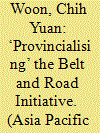

|
|
|
|
|
| Summary/Abstract |
This paper reflects on how the Belt and Road Initiative (BRI) can contribute to more cosmopolitan forms of theory-making and the diversification of knowledges. It focuses on emerging Chinese narratives of the Digital Silk Road (DSR) that cast the initiative as emblematic of an improved BRI 2.0 in the (post-)pandemic era. With subterranean fibre-optic cables and satellite systems constituting important components of the DSR, I argue that these Chinese discourses fundamentally expose the ‘horizontal’ bias in infrastructure debates, thereby forcing an analytical re-orientation towards the notion's volumetric possibilities. Reconceptualising infrastructures in volumetric terms opens up opportunities for interrogating issues of representational politics, power and sovereignty that matter for the DSR and beyond. Using Chinese perspectives of the DSR for the purpose of theory-building, however, does not equate to endorsing Sinocentrism or privileging the BRI as a totalising framework for interpreting the world. Rather, it signifies an effort to ‘provincialise’ the BRI – ensuring that different voices and subjectivities can co-exist in the ongoing and unfinished project of rethinking/reconstructing the BRI.
|
|
|
|
|
|
|
|
|
|
|
|
|
|
|
|
| 2 |
ID:
187080
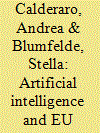

|
|
|
|
|
| Summary/Abstract |
EU Digital Sovereignty has emerged as a priority for the EU Cyber Agenda to build free and safe, yet resilient cyberspace. In a traditional regulatory fashion, the EU has therefore sought to gain more control over third country-based digital intermediaries through legislative solutions regulating its internal market. Although potentially effective in shielding EU citizens from data exploitation by internet giants, this protectionist strategy tells us little about the EU’s ability to develop Digital Sovereignty, beyond its capacity to react to the external tech industry. Given the growing hybridisation of warfare, building on the increasing integration of artificial intelligence (AI) in the security domain, leadership in advancing AI-related technology has a significant impact on countries’ defence capacity. By framing AI as the intrinsic functioning of algorithms, data mining and computational capacity, we question what tools the EU could rely on to gain sovereignty in each of these dimensions of AI. By focusing on AI from an EU Foreign Policy perspective, we conclude that contrary to the growing narrative, given the absence of a leading AI industry and a coherent defence strategy, the EU has few tools to become a global leader in advancing standards of AI beyond its regulatory capacity.
|
|
|
|
|
|
|
|
|
|
|
|
|
|
|
|
| 3 |
ID:
187083
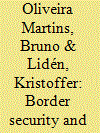

|
|
|
|
|
| Summary/Abstract |
The European Union’s effort at controlling its external borders is an endeavour that increasingly relies on digital systems: from tools for information gathering and surveillance to systems for communicating between different agencies and across member states. This makes EU borders a key site for the politics of “digital sovereignty” – of controlling digital data, software and infrastructures. In this article, we propose a new understanding of how the concepts of digital and sovereignty interplay: sovereignty by digital means, sovereignty of the digital, and sovereignty over the digital. We do it by analysing three key manifestations within the EU’s borderwork: firstly, the expansion of EURODAC to include facial biometric data; secondly, the creation of the (future) shared Biometric Matching System (sBMS); and thirdly, the EU-funded West Africa Police Information System (WAPIS). These databases and systems exemplify three transformations of EU borderwork that invoke different dimensions of digital sovereignty: expansion of techniques for governing migration; interoperability of EU databases facilitating the internalisation of borders through domestic policing; and extra-territorialization of borderwork beyond the geographic limits of the EU.
|
|
|
|
|
|
|
|
|
|
|
|
|
|
|
|
| 4 |
ID:
189398
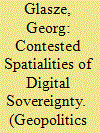

|
|
|
|
|
| Summary/Abstract |
“Digital sovereignty” has become a buzzword in digital policies. Contrary to the imaginary of digital transformation as preceding an era of limitless global networking in the 1990s, approaches to state regulation and delimitation of data flows as well as programmes for national digital infrastructures are justified with calls for digital sovereignty across very different contexts. This forum brings together contributions from political geography, law, computer science, and ethics that compare and analyse discourses and practices of digital sovereignty. The case studies on Russia and the EU reveal parallels as well as fundamental differences in the conception and implementation of digital sovereignty. Essays on the challenges posed by new forms of cross-border interaction (such as cloud computing) and new actors (such as digital platforms) illustrate that the traditional coupling of concepts of sovereignty, territoriality and the state, of jurisdiction and borders, must be rethought. The essays in this forum thus make it clear that the digital transformation is not simply a socio-technical modernisation process. It is rather shaped in specific ways and should be understood and analysed as (geo)-political discourses and practices. The forum contributes to the development of a political digital geography that analyses how the digital transformation is contested and produced in specific ways and unearths the politics and spatialities conceived and produced in these discourses and practices.
|
|
|
|
|
|
|
|
|
|
|
|
|
|
|
|
| 5 |
ID:
171594
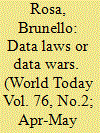

|
|
|
| 6 |
ID:
187081
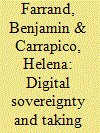

|
|
|
|
|
| Summary/Abstract |
In recent years, we have been able to observe the emergence and mainstreaming of an EU discourse on digital sovereignty, which highlights the importance of gaining back control of EU digital infrastructure and technological production, based on the EU's perceived loss of economic competitiveness, limited capacity to innovate, high degree of dependence on foreign digital infrastructures and service providers and, related to all these factors, difficulty in providing EU citizens with a high level of cybersecurity. Bearing in mind that a considerable percentage of these infrastructures and service providers are under private sector control, the present article asks how this sovereignty discourse conceptualises the role of the private sector in EU cybersecurity. Drawing from a Regulatory Capitalism theoretical model, this article proposes that the EU has instead entered a Regulatory Mercantilist phase where it seeks to reassert its control over cyberspace, impose digital borders, accumulate data wealth and reduce its dependence on external private sector actors whose values may not reflect those of the EU order. A new approach to cybersecurity is emerging, in which the non-EU private sector can be perceived as much of a threat as foreign powers, and from whom digital sovereignty must be secured.
|
|
|
|
|
|
|
|
|
|
|
|
|
|
|
|
| 7 |
ID:
191038
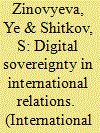

|
|
|
|
|
| Summary/Abstract |
IN THE global digital transformation age, the principle of state sovereignty has acquired an extra, digital dimension. Digital sovereignty, which in the broadest sense means the independence of a country in its digital domestic and foreign policy, is becoming a key criterion for measuring a country's viability, security, and economic status. To better understand the nature of digital sovereignty, it is essential to fully understand the concept of state sovereignty in general.
STUDIES of sovereignty date back to French jurist and philosopher Jean Bodin's 1576 book Six Books of the Commonwealth that defined sovereignty as the supreme, absolute power that a monarch had over his subjects as God's representative on Earth. At first, state sovereignty meant control of a specific territory. Hugo Grotius, Thomas Hobbes, and John Locke were founders of key theories of sovereignty in political science and jurisprudence..
|
|
|
|
|
|
|
|
|
|
|
|
|
|
|
|
| 8 |
ID:
187078
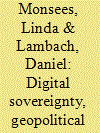

|
|
|
|
|
| Summary/Abstract |
“Digital sovereignty” has emerged as a hot topic in European politics. But although true European digital sovereignty seems unattainable, analysing the digital sovereignty discourse is still useful since it tells us much about European politics. We examine three “projects” which are part of the broader digital sovereignty initiative: 5G, Gaia-X, and the semiconductor industry. This empirical perspective allows for a better understanding of how imaginaries about digital sovereignty play out in these specific tech projects and how these then help to affirm a particular European identity. Methodologically, we focus on how particular geopolitical imaginaries appear in these digital sovereignty projects. Our empirical analysis reveals that Europe’s comparatively weak digital industries are considered a security issue. China and, to a lesser degree, the United States are not only seen as economic rivals but also security threats when it comes to issues such as espionage and data protection. Based on this, we argue that digital sovereignty projects, despite being full of contradictions and tensions, contribute to a distinct EU identity of an agile, future-oriented global player in the digitised economy. This, while not entirely new, is a powerful imaginary even if the proposed idea of “sovereignty” might never be enacted.
|
|
|
|
|
|
|
|
|
|
|
|
|
|
|
|
| 9 |
ID:
187076


|
|
|
|
|
| Summary/Abstract |
The notion of digital sovereignty, also often referred to as technological sovereignty, has been gaining momentum in the European Union’s (EU) political and policy discourses over recent years. Digital sovereignty has come to supplement an already substantial engagement of the EU with the digital across various security policy domains. The goal of this article and of the overall Special Issue is to explore how the discourse and practices of digital sovereignty redefine European security integration. Our core argument is that digital sovereignty has both direct and indirect implications for European security as the EU attempts to develop and control digital infrastructures (sovereignty over the digital), as well as the use of digital tools for European security governance (sovereignty through the digital). It is thus essential to further explore digital sovereignty both in terms of European policies and of a re-articulation of sovereign power and digital technologies – what we suggest calling digital/sovereignty.
|
|
|
|
|
|
|
|
|
|
|
|
|
|
|
|
| 10 |
ID:
180762
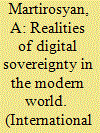

|
|
|
|
|
| Summary/Abstract |
ACHIEVING and ensuring cybersecurity is a global problem and a security challenge for all nations in the digital age. At the international and national levels, rules for regulating cyberspace are being discussed and developed, and solutions to the challenges of global Internet governance are being sought. Digital sovereignty is inevitably becoming a focus of international and national agendas.
|
|
|
|
|
|
|
|
|
|
|
|
|
|
|
|
| 11 |
ID:
182916
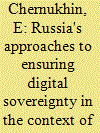

|
|
|
|
|
| Summary/Abstract |
IN TODAY'S world, preserving digital sovereignty is not only an immutable basis but also a guarantee of the existence of a state itself - a means of avoiding potential conflicts in the information environment. Russian President Vladimir Putin, speaking in March 2021 at a meeting of Russia's Security Council, where the [document] Fundamentals of Russian State Policy in the Field of International Information Security was being considered, stressed, in particular, that "Russia stands for the inviolability of the digital sovereignty of all states.... This means that each country can independently determine the regulatory parameters of its own information space and corresponding infrastructure."...
|
|
|
|
|
|
|
|
|
|
|
|
|
|
|
|
| 12 |
ID:
187077
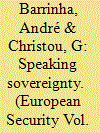

|
|
|
|
|
| Summary/Abstract |
The EU’s revised Cybersecurity Strategy (2020) has been constructed in the context of increasing geopolitical tension and within a dynamically evolving technological environment. The onset of new technologies has brought with it new opportunities but also perceived risks and threats in cyberspace, to which the EU has sought to elicit a more comprehensive approach underpinned by a move to become more “technologically sovereign”. We seek in this article to critically unpack what such claims to technological sovereignty mean for the EU in the cyber domain and what the practical implications are of the EU taking ownership of and performing sovereignty. More specifically, in seeking to conceptually unpack technological sovereignty in its internal and external manifestations, we show how its articulation, legitimisation and operationalisation has implications and consequences for the EU’s identity and action in the cyber domain.
|
|
|
|
|
|
|
|
|
|
|
|
|
|
|
|
|
|
|
|
|